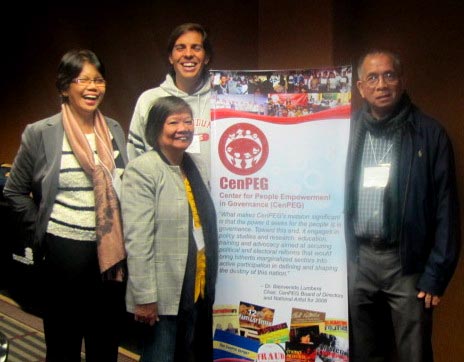MODERNIZING DEMOCRACY:
THE PHILIPPINE EXPERIENCE
3 CenPEG Fellows hold panel presentation at 9th ICOPHIL in Michigan
By CenPEG.org
Nov. 15, 2012
Three Fellows of CenPEG called for major electoral reform in the Philippines including an end to political dynasties and a credible and electronic fraud-free 2013 mid-term election.
The three Fellows – Executive Director Evita L.Jimenez, Director for Policy Studies Bobby M. Tuazon, and IT Fellow Pablo R. Manalastas – underscored this point in a panel presentation at the 9th International Conference on the Philippines (ICOPHIL), held at the Michigan State University, East Lansing, Michigan, Oct. 28-30, 2012.
The CenPEG panel was joined by Lilia Q. Santiago of the University of Hawaii (Manoa). Prof. Santiago used to teach in the University of the Philippines, Diliman campus.
In the CenPEG panel presentation, “Modernizing Democracy: The Philippine Experience,” Jimenez tackled the political culture that promotes the dominance of political dynasties in elections, citing as a glaring example the cases of the Autonomous Region of Muslim Mindanao (ARMM) and the Bikol region. She said that modern technology is incongruent with the prevalent culture of cheating and poor telecommunications infrastructure that in 2010 resulted in technical glitches. Many voters were also disfranchised, she said.
In “The Pilandok Narrative in Philippine History and Society,” Santiago noted the recycling of old structures and rulers despite revolts and “people power uprisings.” She said that people need to reflect on what “people power” means: “Power relations and power structures should be challenged with strategic visions along with the building of new institutions that guarantee empowerment.”
Manalastas proved the lack of transparency in the May 2010 automated elections as indicated, for example, by the lack of voter’s verifiability feature in the system. Not only were voters unaware of the internal complexities and weaknesses of the system but were also left uninformed about the electoral agenda of many candidates, he added.
In his paper, “Political Clans Remain Dominant: Prospects of Modernizing Democracy,” Tuazon debunked the myth espoused by the authors and lead implementers of election automation that modern technology will modernize the electoral process and Philippine democracy itself. Aside from its lack of IT capability, the Commission on Elections (Comelec) erred on its non-compliance with the minimum requirements of the election modernization law including transparency, source code review, and digital signing. That the May 2010 election – when full automation in a nationwide and synchronized election was first implemented – saw the increase in the number of winning political dynasties attests to the fact that poll automation did little to level the playing field in elections which is a prerequisite to a modern democracy, Tuazon said.
Held every four years, the recent ICOPHIL featured 70 panel presentations with screenings of video documentaries and book launchings. Paper presenters and discussants came from various universities, research organizations, cultural institutions, and other groups from the Philippines, U.S. and Hawaii, Japan, South Korea, Australia, and other countries.
Lead organizers of the 9th ICOPHIL included Prof. Bernardita R. Churchill of the University of the Philippines, Prof. Roger Bresnahan of MSU (conference convener), and Siddharth Chandra, Director of MSU’s Asian Studies Center. CenPEG.org
Links to Powerpoints
The Hegemony of the Culture of Traditional Politics in Philippine Elections
Evi-Ta L. Jimenez
The Pilandok Narrative in Philippine History and Society
Lilia Q. Santiago
The Criticalness of Transparency in Automated Elections
Pablo R. Manalastas
Political Clans Remain Dominant: Prospects of Modernizing Democracy
Bobby M. Tuazon

At the conference exhibit hall (l-r) Evi Jimenez, Lilia Q. Santiago, and Bobby Tuazon. Joining them is lawyer Lance D. Collins from Hawaii. CenPEG photo
- Probing presidential platforms
- Conference calls for people-centered policy actions for Asian development and peace
- WWII 'comfort women' urge visiting Japanese emperor: OFFICIAL GOV’T APOLOGY, UPHOLD TRUTH, and JUST COMPENSATION
- FEARLESS FORECAST (EPISODE II): Comelec will not comply with e-Commerce Law in 2016 elections
- Fearless forecast: Comelec’s non-compliance with the AES law in 2016 (last of 2 parts)
- Fearless forecast: Comelec will not comply with the AES law in 2016
- CenPEG releases travelogue
- Experts: Nuisance bets reflect disillusionment, uneven playing field
- Partylist solon presses for tax cuts
- The True Cost of a Political Campaign
- Management decisions: Based on RA 9369 or purely Comelec’s?
- CenPEG holds 1st roundtable with media on presidential poll results
- Filipino IT can do it!
- FIT4E: The only transparent solution
- Realpolitik in the maritime tiff
- China’s challenge to PH sovereignty
- Choosing the next president
- Fixing the presidency, reforming the state
- New Comelec chair says he’s open to other election technologies
- SC ruling on AES Watch Pabillo and IBP vs Comelec, Smartmatic-TIM
- Comelec must explain P3.2B unliquidated cash advances
- CONGRESS ASKED TO HOLD DEMO ON PCOS HACKING
- 25 Bishops ask poll body to stop midnight deal with Smartmatic
- Pope Francis: reform and conversion
- 2 poll watch coalitions stage rally vs Comelec-Smartmatic midnight deal
- AES Watch questions Comelec-Smartmatic midnight deal
- ASEAN-India: Building Youth Partnerships through Culture and Entrepreneurship
- CenPEG forges research exchange and partnership with Jinan University
- FOI: Bearing fruit or foiled again?
- Remittance with Representation: The right to vote of overseas Filipinos
Center for People Empowewrment in Governance (CenPEG), Philippines. All rights reserved


